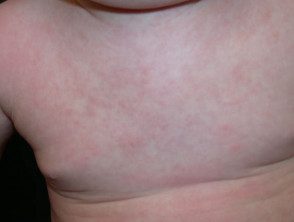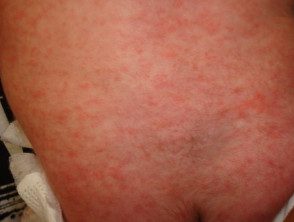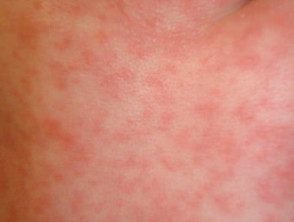What is roseola?
Roseola is a disease caused by the human herpes virus type 6B (HHV-6B) and possibly type 7 (HHV-7). These herpes viruses have only been identified in recent years, and we are still learning about the full range of diseases caused by them.
Roseola is characterized by high fever Lasts 3-5 days, runny nose, irritability, and tiredness. As the fever decreases eruption (exanthema) can appear on the face and body.
Roseola is also known by the names roseola infantum and exanthem subitum.
Roseola



See more images of roseola.
Who gets roseola?
Roseola is most often seen in children between 6 months and three years of age. Most children (86%) will have had roseola by the age of 1 year. Roseola is rarely seen in adults, since infection during childhood it will probably confer lifelong immunity to the disease. Repeated attacks are known to occur, but are not common.
How is roseola spread?
Roseola is transmitted from person to person through the saliva of asymptomatic members of the family. the incubation The period for roseola is approximately 9-10 days after exposure.
What are the signs and symptoms of roseola?
In many cases of roseola, the child looks good with little or no signs or symptoms. Typical cases are characterized by the following:
- High fever (often up to 40 C) for 3 to 5 days.
- Symptoms of the upper respiratory tract, such as a sore throat, cough, runny nose, or congestion.
- Irritability and tiredness.
- The rash appears around days 3-5, as the fever subsides
- Usually small pinkish pink or red dots (2–5 mm in diameter) that whiten (turns white) when touched
- Some spots may be surrounded by a lighter halo of pale skin
- It mainly affects the trunk and rarely extends to involve the neck, face, arms, and legs.
- Similar spots appear on the soft palate and uvula (Nagayama spots)
- Does not itch, does not hurt and does not blister
- It can disappear in a few hours or persist for two days.
In some cases, a child may be infected with the virus and never develop the rash. Less often, the rash may appear without a previous fever. In most cases, particularly if the fever is low, the child is fine. In about 5 to 15% of young children, high fevers can trigger febrile seizures
How is roseola diagnosed?
Because roseola is usually mild and self-limiting, diagnosis is generally based solely on characteristic history and physical examination.
Some labs can confirm HHV-6 infection by serology or Polymerase chain reaction (PCR)
What is the treatment for roseola?
There is no specific treatment for roseola. The disease is usually mild and self-limiting. Rest, fluid intake, and acetaminophen for fever are all that is generally required. No treatment for the rash is necessary as it does not itch or hurt and spontaneously fade away.
What are the complications of roseola?
Complications are rare with roseola in most children. The most common complication is febrile seizures / convulsions that can occur in 5 to 15% of children. These are triggered by high roseola fevers and can be alarming when they are first seen. Signs of a febrile seizure include:
- Loss of consciousness
- Sudden or jerky movements in the arms, legs, or face for 2 to 3 minutes.
- Wet or dirty pants on an unconscious child, trained to go to the bathroom
- Irritability
These seizures are brief and not dangerous. However, you should have a doctor examine your child if one occurs.
Acute encephalitis, hepatitis, myocarditishemophagocytic syndrome and mononucleosis-like infectious disease occurs very rarely.
Reactivation of HHV-6 in immunosuppressed patients or in association with drug hypersensitivity the syndrome produces fever, rash, pneumonia, hepatitis, bone marrow suppression, and encephalitis.
